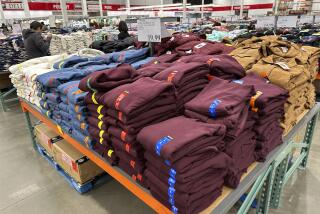Business spending uncertain as durable goods orders slide
- Share via
WASHINGTON — New orders for long-lasting U.S.-made manufactured goods tumbled sharply in May, the government said Wednesday, raising doubts about the strength of the factory sector and business expansion plans.
Orders for durable goods, items meant to last at least three years, slid a more-than-expected 2.8% after a 1.1% rise in April, a Commerce Department report showed.
It was the first drop since January and reflected weak demand for a wide array of products, including goods that businesses need to expand.
Separate reports showed that Midwest factory activity slipped slightly in May and that U.S. mortgage applications fell for the second straight week as interest rates held near recent highs and made buying a home more expensive.
“The May durable goods report indicates that business decision makers remain uncertain about the short-term prospects for U.S. economic growth,” said Cliff Waldman, an economist with the Manufacturers Alliance/MAPI.
The report clouded the picture of a manufacturing revival painted by other recent data. The Institute for Supply Management said this month that factory activity rose to its highest level in more than a year in May.
In a worrisome sign for business investment plans, nondefense capital goods orders excluding aircraft, seen as a proxy for business spending, slipped a larger-than-expected 3%, the biggest drop since January. Economists had expected just a 0.1% decrease.
“This tells us that businesses are spending with caution,” said John Lonski, chief economist at Moody’s Investors Service.
“They are definitely not expanding production capacity within the United States,” he added. “They may be doing so at their production facilities outside the U.S.”
Flagging business investment would add to the uncertainty in the housing market, limiting the economy’s ability to bounce back from the first quarter’s sluggish 0.6% annual growth rate.
Federal Reserve officials were certain to discuss the stress in the housing market and the direction of business spending at a two-day meeting Wednesday and today that was widely expected to end with a decision to hold interest rates steady.
Early this year, they worried about anemic business investment but more recently had grown cautiously optimistic that strong corporate profits and favorable financial conditions would offer support.
Weakness in the volatile aircraft sector was one factor behind the drop in overall orders. Demand for civilian aircraft and parts tumbled 22.7%, pulling transportation equipment orders down 6.8%.
Even excluding transportation, durable goods orders declined 1% as manufacturing, machinery, metals and electrical equipment orders fell.
More to Read
Inside the business of entertainment
The Wide Shot brings you news, analysis and insights on everything from streaming wars to production — and what it all means for the future.
You may occasionally receive promotional content from the Los Angeles Times.










